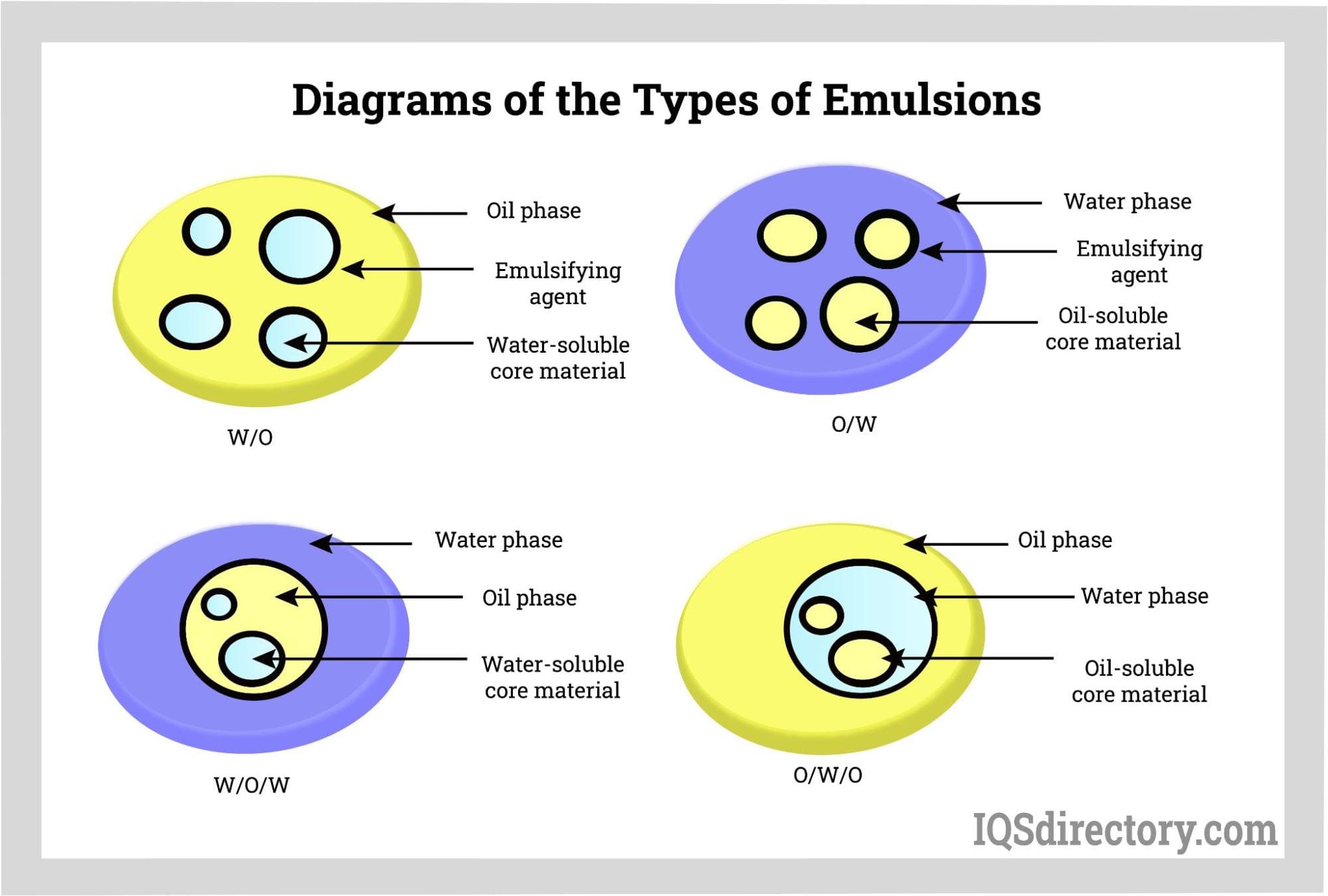What Makes Emulsifiers Essential in Processed Foods?
What Makes Emulsifiers Essential in Processed Foods?
Blog Article
The Scientific research Behind Emulsifiers and Their Significance in Modern Manufacturing
Emulsifiers play a crucial role in modern-day production, acting as the unsung heroes that mix oil and water for a broad array of items. As customer preferences change towards cleaner tags, the demand for cutting-edge emulsifiers is growing.
What Are Emulsifiers?
Emulsifiers are vital representatives in the world of food and product production, acting as the adhesive that binds two otherwise immiscible liquids, like oil and water. Common examples consist of lecithin found in egg yolks and soybeans, and mono- and diglycerides utilized in various processed foods.

When you whip up a salad clothing or delight in a luscious treat, emulsifiers assist preserve that best structure. Without emulsifiers, lots of foods would certainly divide, leading to unwanted structures and flavors.
The Chemistry of Emulsification
When you mix oil and water, you may see they do not blend conveniently; that's where the chemistry of emulsification enters into play. Emulsification takes place when small droplets of one liquid disperse in an additional, developing a secure blend. This occurs because oil and water are immiscible because of their differing polarities-- water is polar while oil is non-polar. To conquer this obstacle, emulsifiers are utilized.
These particles have a hydrophilic (water-attracting) head and a hydrophobic (water-repelling) tail. When you add an emulsifier, its molecules place themselves at the oil-water user interface, decreasing surface tension and permitting the droplets to mix. The emulsifier creates a protective layer around each bead, stopping them from coalescing back right into different layers. Comprehending this chemistry is vital for accomplishing stability in products like dressings, lotions, and sauces, making emulsification necessary in contemporary production.
Types of Emulsifiers
Various kinds of emulsifiers play vital roles in stabilizing mixtures of oil and water. You'll commonly come across two primary categories: all-natural and artificial emulsifiers. All-natural emulsifiers, like lecithin from egg yolks or soy, are stemmed from plants and animals, making them preferred in food. They're normally considered more secure and healthier alternatives.
On the other hand, synthetic emulsifiers, such as mono- and diglycerides, are chemically crafted to enhance stability and service life. They're generally used in refined foods and aesthetic items.
Additionally, you may come throughout non-ionic, anionic, and cationic emulsifiers, each with unique properties that impact their efficiency. Non-ionic emulsifiers, for instance, job well in a broad variety of pH degrees, while anionic emulsifiers often tend to do better in alkaline conditions. Comprehending these types can assist you pick the ideal emulsifier for your details application.
Mechanisms of Emulsion Formation
Comprehending how emulsions form is important for creating stable combinations of oil and water. When you present an emulsifier, it minimizes the surface area tension between the two liquids, enabling them to mix more conveniently.
The emulsifier molecules have a hydrophilic (water-attracting) head and a hydrophobic (oil-attracting) tail. When you include an emulsifier, these molecules arrange themselves at the oil-water user interface. The hydrophilic heads communicate with water, while the hydrophobic tails anchor right into the oil. This develops an obstacle that stabilizes the beads, preventing them from integrating.
Applications of Emulsifiers in Different Industries
Emulsifiers play a vital function across different sectors, making your favorite foods smoother and extra satisfying. In cosmetics, they enhance product appearance and stability, making sure an enjoyable application experience. And also, in pharmaceuticals, they help deliver necessary ingredients properly, improving general efficacy.
Food Market Makes Use Of
While you may not understand it, emulsifiers play a crucial role in the food industry, enhancing the texture, stability, and rack life of many products. In baked items, emulsifiers boost dough handling and preserve dampness, resulting in a better texture and expanded freshness. By making certain uniformity and top quality, emulsifiers are considerable to delivering the scrumptious products you delight in every day, making them a crucial active ingredient in contemporary food manufacturing.
Cosmetic Formulas Benefits
When it pertains to cosmetic formulations, emulsifiers are vital for developing items that feel luxurious and execute properly. They aid blend oil and water, ensuring a smooth and stable consistency in creams, creams, and lotions. You'll discover that emulsifiers enhance item stability, preventing splitting up and extending service life. This suggests you can appreciate your favorite cream without stressing over it going negative too quickly. In addition, emulsifiers improve the application experience, enabling even distribution and much better absorption right into the skin. By utilizing emulsifiers, you likewise achieve an even more appealing appearance, making your cosmetics feel wonderful on your skin. In general, emulsifiers play an important function in delivering high-grade cosmetic products that fulfill your charm requirements.
Pharmaceutical Applications Introduction
In the pharmaceutical market, emulsifiers are crucial for creating effective medications. You'll discover emulsifiers in different dosage types, like lotions, ointments, and More Bonuses fluid suspensions, improving the bioavailability of medications.
The Impact of Emulsifiers on Product Quality

By making sure stable emulsions, you minimize the danger of perishing and extend life span, ultimately saving you time and money. You'll likewise discover that emulsifiers can improve the bioavailability of active ingredients in your products, making them much more efficient for consumers.
Furthermore, they enable you to develop innovative formulations that fulfill varied customer demands. Whether you're crafting a velvety dressing or an elegant lotion, emulsifiers are important for achieving the desired outcomes. In brief, by recognizing and leveraging the impact of emulsifiers, you can significantly elevate the quality of your items.
Future Patterns in Emulsifier Advancement
As the demand for cleaner tags and sustainable products climbs, the advancement of new emulsifiers is set to advance substantially. You'll observe a change towards plant-based and natural emulsifiers, driven by customer preferences for ingredients that are eco-friendly and less refined. Advancements in biotechnology will likely enhance the capability and effectiveness of these emulsifiers, allowing manufacturers to produce secure formulations with fewer ingredients.
You might additionally see a boost in multifunctional emulsifiers that not only maintain emulsions however also boost flavor, appearance, or nutritional worth. This fad might simplify active ingredient lists while improving item performance.
Additionally, with advances in nanotechnology, emulsifiers can be engineered at the molecular degree to achieve extraordinary stability and efficiency. Emulsifiers. As you explore these patterns, you'll find that the future of emulsifier advancement is not almost capability, but likewise concerning accepting sustainability and transparency in components
Frequently Asked Inquiries
Are Emulsifiers Safe for Usage in Food Products?
Yes, emulsifiers are usually risk-free for intake in food. They have actually been thoroughly studied and authorized by food safety and security authorities, so you can appreciate your preferred foods without stressing about their influence on your health and wellness.
Can Emulsifiers Be Derived From All-natural Sources?
Yes, you can derive emulsifiers from click here for more info natural sources. Active ingredients like lecithin from egg yolks or soybeans and casein from milk are common. These natural emulsifiers assist maintain mixtures without artificial additives, making them popular in different items.

Just How Do Emulsifiers Affect Shelf Life of Products?
Emulsifiers support mixes, protecting against separation and perishing - Emulsifiers. By maintaining harmony, they expand products' life span, ensuring freshness and top quality. You'll discover that emulsifiers assist maintain your favored foods and cosmetics carrying out more than time
What Are Potential Side Impacts of Emulsifiers?
You could experience find gastrointestinal problems when consuming items with emulsifiers, as they can interrupt gut germs. Some research studies recommend potential links to inflammation or allergic reactions, but more research study is required to totally understand these effects.

Are There Alternatives to Typical Emulsifiers?
Yes, there are options to typical emulsifiers. You can check out alternatives like natural periodontals, starches, or lecithin. Each alternative offers special homes, so experiment to locate what works best for your certain application.
Report this page